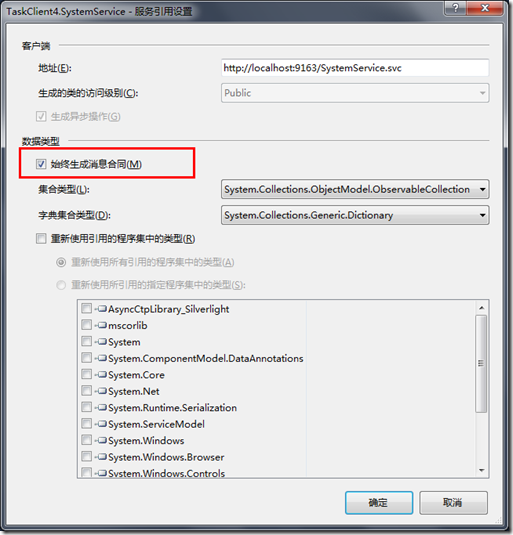上一篇的工具生成方法有个致命缺点:当wcf的参数个数大于或者等于4时,将会报错,因为Task.Factory.FromAsync这个方法最多支持三个参数.
为了解决这个问题,临时的解决办法是配置生成服务引用时选择"始终生成消息合同",如下图.
虽然这样可暂时解决这个问题,但使用有了这个消息合同后使用非常不变,每次调用Wcf方法时总要new一个XXXRequest.
这个版本解决这个问题,解决思路如下:
对于这样一个Wcf方法:
public int Add(int a, int b, int c, int d, int e)
{}
多生成一个Request类:
public class AddRequest
{
public Int32 a { get; set; }
public Int32 b { get; set; }
public Int32 c { get; set; }
public Int32 d { get; set; }
public Int32 e { get; set; }
}
再多生成一个BeginXXX的方法代替Channel.BeginXXX:
private System.IAsyncResult BeginAdd(AddRequest request, AsyncCallback callback, Object asyncState)
{
return Channel.BeginAdd(request.a, request.b, request.c, request.d, request.e, callback, asyncState);
}
这个适配方法用前面定义的Request类为参数,代替了原来有很多参数的Channel.Begin方法,然后在FromAsync里使用这个方法:
public Task<Int32> AddTaskAsync(int a, int b, int c, int d, int e)
{
var request = new AddRequest();
request.a = a;
request.b = b;
request.c = c;
request.d = d;
request.e = e;
return Task<Int32>.Factory.FromAsync(BeginAdd, Channel.EndAdd, request, null);
}
很简单,先new一个Reuqest,再在FromAsync里使用前面的Begin方法(注意不是Channel.Begin),因为我们定义的Begin的方法只有一个参数,这样就绕过了,FromAsync最多只能有三个参数的问题.
这个版本还有一个改变就是使用CodeDom代替替换字符串的思路来生成代码,有兴趣的自己参考代码.
